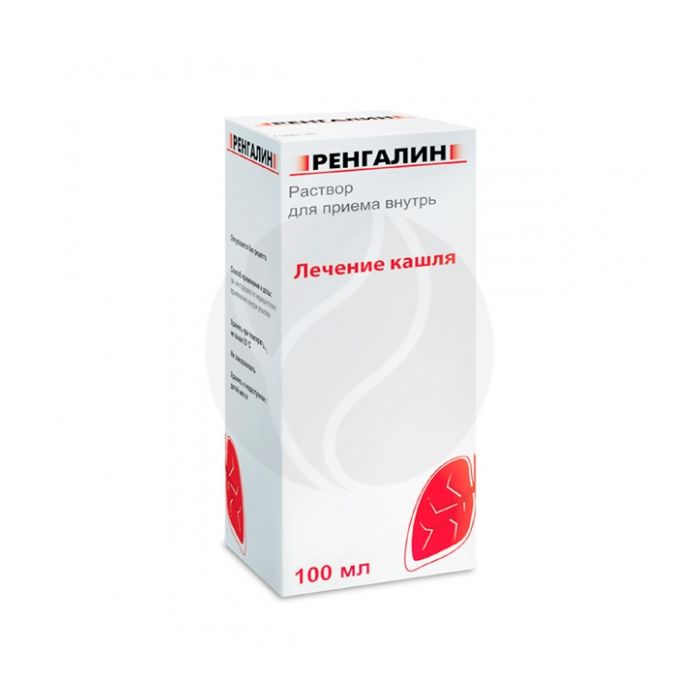Rengalin solution for oral administration, 100ml
Expiration Date: 05/2027
Russian Pharmacy name:
Ренгалин раствор д/приема внутрь, 100мл
Rengalin is indicated for use in adults and children from 3 years of age.
productive and unproductive cough with influenza and ARVI, acute pharyngitis, laryngotracheitis, acute obstructive laryngitis, chronic bronchitis and other infectious-inflammatory and allergic diseases of the upper and lower respiratory tract.
The drug is taken orally. At one time - 1-2 teaspoons (5-10 ml) - outside the meal. It is advisable to keep the solution in the mouth before swallowing for maximum drug effect.
Apply 1-2 teaspoons 3 times / day. Depending on the severity of the condition in the first 3 days, the frequency of administration can be increased up to 4-6 times / day.
The duration of therapy depends on the severity of the disease and is determined by the attending physician.
Oral solution in the form of a colorless or almost colorless, transparent liquid.
100 ml
antibodies to bradykinin affinity purified 0.12 g *
antibodies to histamine affinity purified 0.12 g *
antibodies to morphine affinity purified 0.12 g *
* are introduced in the form of a mixture of three active aqueous dilutions of the substance, diluted 10012, 10030, 10050 times, respectively.
Excipients: hypromellose - 1 g, maltitol - 6 g, glycerol - 3 g, potassium sorbate - 0.165 g, anhydrous citric acid - 0.02 g, purified water - up to 100 ml.
Children under 3 years old;
hereditary fructose intolerance (due to the presence of maltitol in the composition);
increased individual sensitivity to the components of the drug.
The drug should be prescribed with caution in diabetes mellitus.
pharmachologic effect
It has been shown experimentally that the components of the preparation modify the activity of the ligand-receptor interaction of endogenous regulators with the corresponding receptors: antibodies to morphine (a component of the preparation) - with opiate receptors; antibodies to histamine - with histamine H1 receptors; antibodies to bradykinin - with bradykinin receptors; while the combined use of the components leads to an increase in the antitussive effect.
In addition to the antitussive action, the complex drug, due to its components, has an anti-inflammatory, anti-edema, antiallergic, antispasmodic (antibodies to histamine, antibodies to bradykinin) and analgesic effect (antibodies to morphine).
The complex drug Rengalin, due to the modification of histamine-dependent activation of H1-receptors and bradykinin-dependent activation of B1 and B2 receptors, selectively reduces the excitability of the cough center of the medulla oblongata, inhibits the central links of the cough reflex. Oppressing the centers of pain sensitivity in the thalamus, it blocks the transmission of pain impulses to the cerebral cortex. Inhibits the flow of pain impulses from the periphery due to a decrease in the release of tissue and plasma algogens (histamine, bradykinin, prostaglandins and others). Unlike narcotic analgesics, it does not cause respiratory depression, drug dependence, does not have narcogenic and hypnotic effects.
Eases the manifestations of acute pharyngitis, laryngitis and bronchitis, reducing bronchospasm. It relieves systemic and local symptoms of allergic reactions by influencing the synthesis and release of histamine and bradykinin from mast cells.
Pharmacokinetics
The sensitivity of modern physicochemical methods of analysis (gas-liquid chromatography, high-performance liquid chromatography, gas chromatography-mass spectrometry) does not allow assessing the content of the active substances of Rengalin in biological fluids, organs and tissues, which makes it technically impossible to study pharmacokinetics.
Side effect
Possible reactions of increased individual sensitivity to the components of the drug.
If these side effects are aggravated or any other side effects not indicated in the instructions are noted, the patient should inform the doctor about it.
Application during pregnancy and lactation
The safety of using Rengalin in pregnant women and during breastfeeding has not been studied. During pregnancy and during breastfeeding, the drug is used only if the intended benefit to the mother outweighs the potential risk to the fetus and child. The benefit / risk ratio is determined by the attending physician.
Application in children
The drug is contraindicated in children under 3 years of age.
special instructions
If necessary, a combination with mucolytics is possible.
Patients with diabetes mellitus should remember that each teaspoon (5 ml) of the drug contains 0.3 g of maltitol, which corresponds to 0.02 bread units (XE). Insulin is required for the metabolism of maltitol, although due to slow hydrolysis and absorption in the gastrointestinal tract, the need for insulin is low. The energy value of maltitol is 10 kJ or 2.4 kcal / g, which is significantly less than that of sucrose. The energy value of 1 teaspoon of the preparation is approximately 5.7 kJ (1.37 kcal).
Influence on the ability to drive vehicles and mechanisms
Has not been studied.
Overdose
Symptoms: in case of an accidental overdose, dyspeptic phenomena (nausea, vomiting, diarrhea) are possible, due to the fillers included in the drug (maltitol, glycerol).
Treatment: carrying out symptomatic therapy.
Drug interactions
In the course of clinical studies, no data were obtained on the interaction of Rengalin with drugs used as concomitant therapy.

